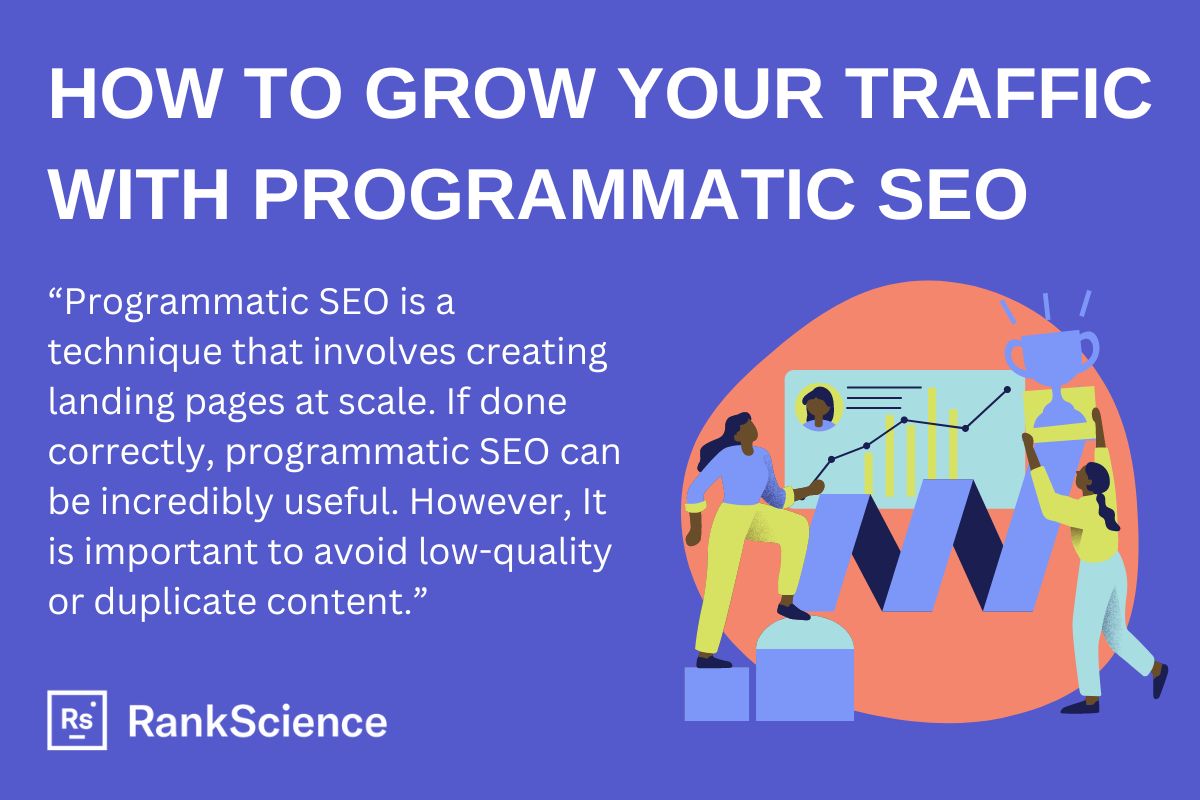Search engine optimization (SEO) is a quintessential ingredient in the success of modern businesses. In our ever-connected world, you need a great Internet presence for people to find you! SEO helps you climb the ranks of search engine result pages (SERPs), helping your site gain more visibility than ever before.
SEO involves many core strategies, and one of the biggest involves using specific keywords that people use to find sites like yours. There are many words you can target. But what if you could create hundreds or thousands of pages to target every possible keyword iteration imaginable?
With programmatic SEO, you can! Programmatic SEO is a unique strategy employed by some of the biggest websites on the Internet. While not beneficial for every website, this technique can lead to tons of visibility and substantial improvements to your organic traffic.
What Is Programmatic SEO?
Programmatic SEO is a technique that involves creating landing pages at scale. Each landing page targets a different low-competition or long-tail keyword, dramatically increasing your odds of ranking higher on search engine result pages.
You’ll discover many keywords relevant to your site when you use RankScience’s Content Insights Tool for keyword research. You’ll see which keywords have the most searches but also uncover low-competition keywords that your competition may not target.
When you employ programmatic SEO, you create hundreds or thousands of dedicated landing pages. Each landing page is similar, utilizing the same templates and many identical elements. However, the information on each page is unique, ensuring that your site delivers the impactful content visitors are looking for.
There are many ways to build landing pages. Contentedge is an AI-powered content generation tool that lets you create high-ranking content in mere seconds. That’s one way to make landing pages unique. But you can also utilize automated tools to build similar-looking pages with distinct data.
You’ve likely come across programmatic SEO pages before. This technique is the go-to for companies that offer services in many locations. One of the most widespread uses of programmatic SEO is through travel sites.
For example, you might search “Best hotels in San Francisco” for an upcoming business trip. Some of the highest-ranking sites will be booking platforms with a list of hotels and prices.
Sites that use programmatic SEO can get millions of pageviews yearly, making up a substantial piece of their organic traffic numbers.

What Are the Benefits?
Programmatic SEO is a unique approach compared to garden-variety SEO. But the extra work involved can pay off massively.
The biggest benefit? You can target entire keyword buckets and rank high for all available searches in one go. This technique allows you to target full categories, boosting visibility significantly.
Furthermore, programmatic SEO focuses on low-competition keywords. For example, you might use your site to sell summer dresses. Instead of only targeting the high-competition keyword “summer dresses,” you can also target “best summer dresses in 2023″ or “summer dresses in San Francisco.”
Ranking high on low-competition keywords is easier because your rivals aren’t targeting them. Your ranking and visibility can increase when you target hundreds of those keywords. With that increased visibility also comes more opportunities for backlinks, building your site’s overall authority in your niche.
Finally, low-competition keywords have another huge benefit: They come from high-value search users. Think about it: You wouldn’t search for “Best hotels in San Francisco” unless you were ready to explore possible bookings. For this reason, programmatic SEO is a fantastic way to get more organic traffic while getting more conversions and sales.
Common Misconceptions About Programmatic SEO
There’s a lot to love about programmatic SEO. But there are also a couple of big misconceptions that prevent businesses from taking full advantage of it.
The first is that the landing pages you create for programmatic SEO strategies are nothing more than spam. Many people believe this, giving the approach a less-than-stellar reputation in some circles.
But the truth is that those landing pages are only spam if they don’t provide useful content. The problem that many have with programmatic SEO is that you’re producing thousands of pages with similar content. That runs the risk of creating content that offers very little value to users, also known as “thin content.”
However, if you do it correctly, programmatic SEO can be incredibly useful. It all comes down to the search engine user’s intent and needs. If your landing pages provide content that matters, it won’t fall under the spam umbrella. That’s why programmatic SEO works so well for booking sites. People are looking for that information, so it’s useful.
It is important to avoid low-quality or duplicate content. Otherwise, you could violate Google’s spam policies.
Another common misconception is that programmatic SEO involves tons of work. At face value, it can be intimidating! Creating thousands of landing pages feels like an impossible task.
But it’s called “programmatic SEO” for a reason. You don’t build landing pages manually. Instead, you make one great template and develop a database with the unique data you want to appear on every page. Programmatic SEO does involve some coding knowledge, but there are also no-code tools you can utilize if you want to invest in this approach.
Automation is key for programmatic SEO. It handles the brunt of the work and makes publishing all those landing pages possible.
Expert Tips To Increase Your Website’s Performance
Ready to give programmatic SEO a shot? Here are a few tips to follow.
Focus on Low-Competition Keywords
Low-competition keywords are important for programmatic SEO. Fewer competitors target them, so there’s a greater chance of ranking. Use RankScience’s Content Insight Tools to find keywords you should focus on.
Choose Your Head Terms and Modifiers
You’ll need a head term and multiple modifiers when building landing pages. The head term is the top-level category of keywords. Meanwhile, the modifiers create long-tail keywords.
For example, “Best Hotel” might be the header if you run a chain with multiple locations. Then, your modifiers would be the locations, like “in San Francisco” or “in New York.”
Understand Intent
Before you create your pages, understand the intent of search engine users. The most successful programmatic SEO strategies target keywords with specific intent.
For example, a user might have the intention to gain more information. Returning to the hotel example, that could be “What hotels are in San Francisco.”
Or, they could have commercial intent and want to learn more about a product or service before purchasing it. For example, “Best hotels in San Francisco.”
Users may also be ready to make a purchase, giving them transactional intent. An example would be “Book hotel in San Francisco.”
Understanding intent guides you in the right direction when creating content and building the template.
Build a Great User Experience
Page performance and the overall user experience matter with programmatic SEO. Deliver relevant information front and center and ensure your pages load quickly.
Build Internal Links
Programmatic SEO landing pages are a great opportunity to build internal links. When you have hundreds or thousands of pages, you can use internal linking to increase the number of pages search engines index and keep visitors around longer.
Optimize URL Structure
Finally, improve the URL structure and site hierarchy for easy crawling and indexing. Sort your keywords and use them in title tags and metadata. Then, use descriptive words instead of numbers or abbreviations. You can use hyphens for better readability and build your URL structure for easy navigation.
Supercharge Your SEO with RankScience
Employing programmatic SEO is easier than you think. When you’re ready to take full advantage of what this approach offers, reach out to RankScience! We’re a full-stack SEO company with over a decade of experience helping sites reach their full potential. Our custom-built strategies are unique to every website, and we combine data-driven methods with the power of AI to help you see results.
We have what it takes to employ programmatic SEO for your site and help you gain more traffic than ever. Contact us today to learn more and see firsthand what programmatic SEO can do for your site!





